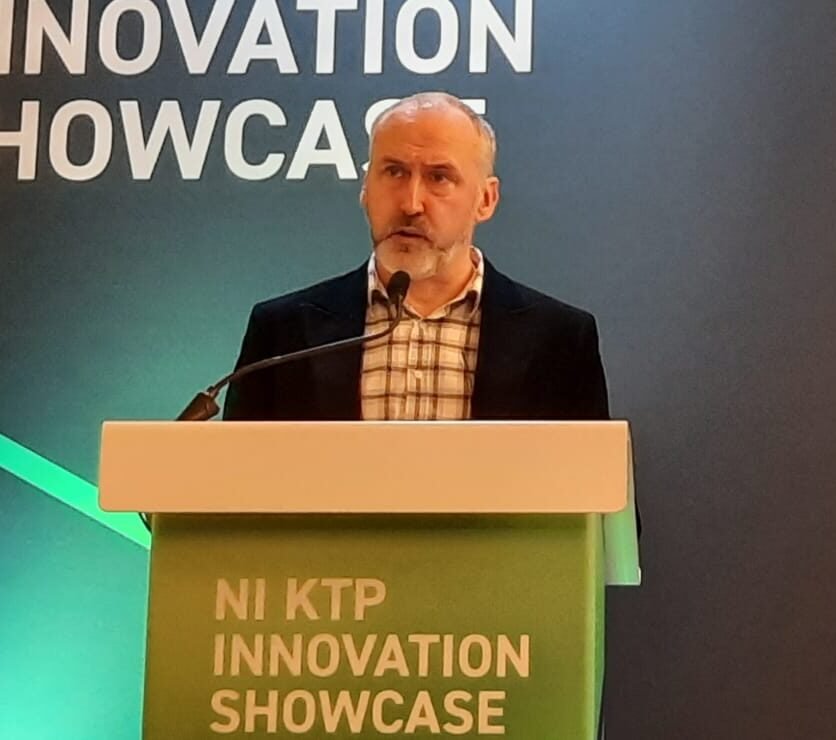
Upcoming Events

Creating Accessible Documents
Date & Time
Thursday 5th December, 2024
9:30 AM - 4:30 PM
Venue
Online
CPD Certified
Availability
4 Spaces left
Purchase
Overview
If you are responsible for creating any content whether that be producing documents, social media, or web content for your organisation, this course will give you a strong grounding to make the most accessible content possible. Documents are a great starting point for everyone to learn universal accessible content basics as well as getting to grips with the accessibility features of the most common tools including Office 365 programs and PDFs.
Our Creating Accessible Documents course gives you the knowledge to create highly accessible documents. If you are from the public sector, publishing accessible digital content including documents is now a legal requirement. You will learn how to make documents accessible using a host of different tools, and how to apply plain English principles to create easy to understand content.
Leave the day fully immersed in document accessibility with the confidence to ensure your documentation complies with the regulation and is accessible to all.
Learning Objectives
By the end of this training, delegates should have the knowledge and tools to:
Understand the legislation relating to accessible documents
Embed basic principles of accessible documents for the following platforms:
Word
PowerPoint
PDF
Email
Check documents for accessibility
Adopt technologies to help create accessible documents
Use accessible documents effectively
Lead Trainers
Ben Watson
Accessibility Consultant
All Able
George Rhodes
Accessibility Consultant
All Able
Agenda
9:30 am
Welcome And Clarification Of Learning Objectives
9:45 am
Session 1: An Introduction to Accessible Documents
How are documents covered in the legislation
Basic principles of creating accessible documents
Why documents are the core of accessible content design
Ben Watson
Accessibility Consultant
All Able
George Rhodes
Accessibility Consultant
All Able
11:00 am
Morning Break
11:10 am
Session 2: Checking For Accessibility
As part of the checking for accessibility session, attendees will be asked to suggest documents that we can review as a group. This can be done either in advance of the day or as the discussion unfolds.
· Understanding different document platforms
· Gain techniques for checking for accessibility
· Microsoft Accessibility Checker
· Live document walkthroughs
· Adobe Pro and making accessible PDFs.
Ben Watson
Accessibility Consultant
All Able
George Rhodes
Accessibility Consultant
All Able
12:30 pm
Lunch Break
1:00 pm
Session 3: Writing in Plain English (Part 1)
What is plain English?
Plain English and accessibility
How to write in plain English: core principles
Ben Watson
Accessibility Consultant
All Able
George Rhodes
Accessibility Consultant
All Able
2:00 pm
Session 4: Writing in Plain English (Part 2)
Group exercise: turning text into plain English
Exploring the benefit of plain English for your organisation
Plain English toolkit
Ben Watson
Accessibility Consultant
All Able
George Rhodes
Accessibility Consultant
All Able
2:50 pm
Afternoon Break
3:00 pm
Session 5: Using Technology for Accessible Documents
Technologies that can help create and use accessible documents
Creating accessible templates
Ben Watson
Accessibility Consultant
All Able
George Rhodes
Accessibility Consultant
All Able
3:30 pm
Session 6: Open Q&A
In this session you will have the opportunity to ask our experts all your accessibility questions, revisiting key sessions from the training and gaining key insights into how you can put what you’ve learned into practice.
Ben Watson
Accessibility Consultant
All Able
George Rhodes
Accessibility Consultant
All Able
4:30 pm
Training Close
*programme subject to change
Pricing
Public Sector
£345 + VAT
Private Sector
£445 + VAT

Effectively Identifying and Tackling Rogue Landlords
Date & Time
Tuesday 3rd December, 2024
09:30 AM - 16:00 PM
Venue
Online
CPD Certified
Availability
3 Spaces Left
Purchase
Overview
With the Labour Government’s Renters’ Rights Bill potentially reinforcing legislative measures against rogue landlords, the Government’s commitment to ban no-fault evictions and extend Awaab’s law to private rented properties, will add an increased emphasis on local authorities to lead the fight against rogue landlords.
Our Effectively Identify and Tackling Rogue Landlords event gives you a better understanding on how you might be able to use the powers granted to you by the Renters’ Rights Bill and other relevant legislation. Acquire tools to scope out rogue landlord activity within your area. Gain proactive approaches to identifying rogue landlords and learn best practice for effectively investigating and prosecuting cases of rogue landlords.
Learn how to utilise and share data to map out potential criminal activity and gain techniques to improve how you enforce and prosecute rogue landlords.
Take back a rogue landlord reduction action plan to use within your organisation.
Learning Outcomes:
Gain an overview of the rogue landlord legislative landscape
Learn how to better identify rogue landlords and build a more comprehensive understanding of their criminal operation within your area
Utilise and share data to identify and tackle rogue landlords
Improve how you enforce and prosecute rogue landlords
Take back a rogue landlord reduction action plan to use within your organisation
Expert Trainer: Paul Oatt
Chartered Health Environmental Practitioner
Paul is a Chartered Environmental Health Practitioner with 20 years of experience in Environmental Health and Housing Enforcement. He works in local government and has lectured in Environmental Health at Cardiff Metropolitan University and Middlesex University. He now supervises Public Health students at the University of Greenwich.
Paul authored Selective Licensing: The Basis for a Collaborative Approach to Addressing Health Inequalities. The book examines the impact of licensing and regulatory enforcement. He also contributed a chapter on enforcement in Regulating the Privately Rented Housing Sector: Evidence into Practice a book that brings together academics and practicing experts to guide professionals in housing regulation and implementation.
Paul’s next book Private Sector Housing and Health: Evaluating the effectiveness of regulation intended to protect the health of tenants is available for pre-order from Routledge publications on the 29th May and examines the effectiveness of housing enforcement and tenant protection in the private rented sector and also looks at the proposed changes to be bought about by the Renters (Reform) Bill and the feasibility of their implementation.
Agenda
9:30 am
Login and Accessing the Online Platform
9:45 am
Chair’s Introduction & Clarification of Learning Objectives
Paul Oatt
Chartered Environmental Health Practitioner
10:00 am
Gain an Overview of Rogue Landlord Legislation
Understand the potential impact of the Renters’ Rights Bill
Understand the legislations potential implications for future enforcement
Gain an overview of the rogue landlord legislation landscape: such as the Housing and Planning Act 2016
Learn about the potential application of the Decent Homes Standard to the private rented sector.
Paul Oatt
Chartered Environmental Health Practitioner
10:45 am
Break
11:00 am
Identifying Rogue Landlords
Gain techniques to identify rogue landlords
Learn how to train staff to detect criminal activity
Receive advice on using innovative ways to identify rogue landlords with limited resources
Paul Oatt
Chartered Environmental Health Practitioner
12:00 pm
Utilise and Share Data to Reduce Rogue Landlords
Learn how to efficiently collect data on rogue landlords in your area
Use data to identify and crackdown on the criminal networks of rogue landlords
Effectively share data with other organisations to help reduce the number of rogue landlords
Paul Oatt
Chartered Environmental Health Practitioner
1:00 pm
Lunch
2:00 pm
Workshop: Develop a Rogue Landlord Reduction Plan
Discuss in groups and with the trainer, how to tackle rogue landlords
Learn how to support private tenants when dealing with rogue landlords
Effectively engage with tenants to help reduce criminal activity
Identify innovative ways to tackle rogue landlords, with a limited workforce
Develop more effective services to help tenants
Design a toolkit to reduce the number of rogue landlords
Create an action plan to identify and reduce rogue landlords
Paul Oatt
Chartered Environmental Health Practitioner
3:00 pm
Training Close
Programme subject to change

Ensuring Public Sector Website Accessibility and Compliance
Date & Time
Wednesday 27 November, 2024
09:30 AM - 16:30 PM
Venue
Online CPD Workshop
Availability
3 Spaces Left
Purchase
Overview
This one day course is for people new to accessibility and experienced alike. Improving digital accessibility in an organisation requires changes from many different areas of a business. It is not just about auditing for accessibility compliance, or making reasonable adjustments when there are requests. It is about building a consistent approach to make accessibility part of the core behaviours of an organisation in all areas. Whether that is during the procurement of new digital platforms, recruiting new members of staff, content writing and document production, including accessibility into policies and supporting all stakeholders in inclusive and proactive ways.
This event is focused on understanding the regulations, policy and how to cover all of the important management tasks to defend against legal challenges, along with embedding accessibility as a responsibility for all staff.
Learning Objectives
By the end of the workshop, delegates will gain:
An introduction to accessibility and how to begin persuading others to join in on accessible practices.
A better understanding of accessibility legislation in the UK and current applicable legislation including the public sector bodies accessibility regulations and the upcoming EU Accessibility Act
Web content accessibility guidelines, how to conduct and report on basic web testing and a host of tools to help you.
Comprehensive guidance on including accessibility into procurement processes to help you avoid buying in problems.
An introduction to accessible document and basic accessibility practices which you can incorporate into all staff produced documents
Resources Provided
To support delegate learning, we will be providing training materials and resources for them to take away to help implementation of their learning after the course. We will provide:
Practical exercise materials
Full slide deck and notes printed
Copies of our award-winning Digital Accessibility Toolkit including; reference material, templates and cheat sheets
The regulations
Quick accessibility checks
Auditing, reporting and prioritisation
Procurement and suppliers
3rd party content and systems
Accessibility statements
Disproportionate burden
Accessible documents
Accessible events
Video accessibility
Writing in plain English
Key Speakers
Ben Watson
Accessibility Consultant
All Able
George Rhodes
Accessibility Consultant
All Able
Agenda
9:30 am
Welcome
9:45 am
Accessibility and Inclusion
10:10 am
Session 1: Understanding the Accessibility Requirements for Public Sector Bodies
The Public Sector Bodies (Websites and Mobile Applications) Accessibility Regulations 2018 - how did the regulation come about and what it aims to achieve
Apply the Website Content Accessibility Guidelines (WCAG) 2.2
Outlining who and what falls under the new legislation and who is exempt
Memorandum of Understanding and how the process of monitoring and enforcement operates
Getting senior management on board – realising the scale of work involved and prioritisation
Prioritisation and risk assessment exercise
Budgeting resources and tools to ensure value for money
Sources for keeping in touch with the latest developments
Ben Watson
Accessibility Consultant
All Able
George Rhodes
Accessibility Consultant
All Able
11:00 am
Morning Break
11:15 am
Preparing your Organisation for the Changes - Policy and Practical Steps
Publishing the accessibility statement
Outlining the requirements of an accessibility statement
Discussion exercise on the purpose of accessibility statements and what other information users might want
Procurement and Suppliers
What to include in procurement, tenders and contracts
What to expect from suppliers
What to do with existing suppliers
3rd Party systems and your responsibilities
3rd Party responsibility matrix
Your responsibilities exercise
Ben Watson
Accessibility Consultant
All Able
George Rhodes
Accessibility Consultant
All Able
12:30 pm
Lunch
1:00 pm
Decide how to check for accessibility problems
Reviewing internal processes and ensuring that all staff involved are effectively trained
Basic checks for accessibility – Where do you need to address the problem and how
Image alternatives
1. Video and Audio content
2. Documents
3. Websites (intro)
4. Other comms
Ben Watson
Accessibility Consultant
All Able
George Rhodes
Accessibility Consultant
All Able
2:30 pm
Afternoon Break
2:40 pm
Achieving Accessibility Under the New Standard
Which web content accessibility guidelines do you need to adhere to and understand WCAG 2.2
Learn about the process of testing sites for accessibility using automatic scanning tools versus an audit
Live testing exercise
Understanding accessibility evaluations and testing results
Issue reporting, exclusions and disproportionate burden – what is it and what does it apply to
How diverse user testing can inform accessibility audits and future development plans
Discussing common accessibility issues and how to overcome them
Creating content, including dynamic and visual, with accessibility in mind
Ben Watson
Accessibility Consultant
All Able
George Rhodes
Accessibility Consultant
All Able
3:40pm
Break
3:45 pm
Open Questions
In the final session, we want delegates to be able to ask any questions that they feel we haven’t fully addressed and welcome the discussion of real issues delegates are facing
This is a chance for delegates to get some consultancy time with us and a chance for real expert advice on their real issues
If you have any questions you made a note of during the day because we had to get through a lot, now is the time to ask them!
Ben Watson
Accessibility Consultant
All Able
George Rhodes
Accessibility Consultant
All Able
4:30 pm
Summary and Close
*programme subject to change
Pricing
Health & Voluntary Sector
£245 + VAT
Public Sector
£345 + VAT
Private Sector
£445 + VAT

Effectively Handling Complaints in Housing
Date & Time
Tuesday 26th November, 2024 | 9:45 AM - 15:00pm
Venue
Online CPD Event
Availability
3 Spaces Left
Purchase
Overview
The introduction of the new Complaint Handling Code and the focus on complaint management in social housing highlight a critical need for landlords and housing providers to adhere to best practices. The joint code, along with increased oversight from the Regulator, puts pressure on ensuring that tenants' issues are promptly addressed, while also encouraging landlords to learn from complaints to improve their services.
Given the heightened scrutiny—especially following the Grenfell tragedy and the poor handling of damp and mould—it's clear that complaint handling has evolved from a simple regulatory requirement into a broader measure of service quality and tenant safety. The implementation of effective systems to manage, resolve, and learn from complaints is now a key part of organisational accountability in social housing.
By attending our Effectively Handling Complaints in Housing event, gain essential insights into the expectations laid out by the Ombudsman and Regulator. It's a valuable opportunity to acquire practical tools and learn from peers who are grappling with similar challenges, potentially finding shared solutions that improve tenant relations and service delivery.
Learning Outcomes
Learn from experts, formerly with the Housing Ombudsman Service, about the latest requirements for good complaint handling in line with the Complaint Handling Code
Hear how to avoid common mistakes and resolve complaints through effective investigations and robust written complaint responses
Learn what to consider when proposing an appropriate and proportionate remedy to resolve a complaint
Hear how best to use customer feedback to learn from complaints and improve services for residents
Increase your awareness of the importance of keeping up to date and accurate records and avoid common pitfalls in record keeping
Hear about the latest and coming developments in complaint-handling, and discuss these with the trainers and other delegates
Lead Trainers
Dave Simmons
Company Director of the Housing Mediators
Dave Simmons is the company Director of the Housing Mediators which provides a mediation service focusing on housing and workplace disputes, as well as a training and support service for landlords specialising in effective complaint management.
He spent 15 years at the Housing Ombudsman Service where he worked as an Adjudicator and Sector Engagement Lead. His achievements included leading on the project to write and publish the first Complaint Handling Code. After leaving the Ombudsman he spent two years as Peabody’s Compliance Operations Manager, where his duties included overseeing compliance with the Ombudsman Service.
Dave is a long-term associate of HQN and Tpas (Tenant Engagement Experts) and in his various roles he has delivered hundreds of training workshops, forums and webinars to the housing sector covering a breadth of subjects. He has also written dozens of briefings and best practice documents which he currently continues to do in his capacity as HQN’s Complaints Hub Lead.
He is an experienced accredited mediator and has mediated on a wide range of disputes including family, community and workplace. As a Board Trustee of Croydon Community Mediation, he co-produces newsletters which promote learning and knowledge sharing for its small team of community mediators
John Goodwin
Housing Consultant, Trainer and Mediator
Former Compliance & Systemic Lead at the Housing Ombudsman Service
Agenda
9:45 am
Logging on and Accessing the Online Platform
10:00 am
Expert’s Welcome and Overview of Learning Objectives
10:10 am
Understanding the Role of the Housing Ombudsman Service and Requirements of the Complaint Handling Code
The role and powers of the Housing Ombudsman Service
Understanding what the Housing Ombudsman expects of social housing landlords
The requirements of the Ombudsman’s ‘Complaint Handling Code, including current significant changes to the Code
10:40 am
Group Work: What’s Working Well and Areas For Improvement
Group discussions about what is working well in complaint handling in your organisation, and what you struggle with
Feedback from groups and discussion of key themes with trainers
The trainers will address the feedback from groups and pick up on any questions or areas of uncertainty during the remaining sessions
11:10 am
Resolving Complaints Effectively
Key requirements and things to get right when looking to resolve complaints effectively, including taking account of vulnerabilities and managing unreasonable behaviour
Tips for avoiding common pitfalls
Hear real life examples from the trainers’ experience and from the Housing Ombudsman Service’s complaint investigations
11:40 am
Morning Break
11:55 am
Insurance claims and the Pre-Action Protocol for Housing Conditions
How should landlords deal with complaints that involve insurance claims, or potential legal action e.g. for disrepair?
Landlords are often unclear about how to handle these tricky cases. Our trainers will set out the Ombudsman’s guidance and expectations
12:05 pm
Record Keeping
The trainers will highlight areas of good and poor practice, and how to tackle common problem areas, such as records of verbal agreements and missed appointments
12:15 pm
Remedies to Disputes
Consider what to include in an effective remedy, including compensation payments
Hear about some creative solutions and innovative approaches that landlords have used to resolve disputes
12:45 pm
Lunch Break
13:15 pm
Effective Written Responses to Complaints
Learn how to improve responses and receive guidance on the latest requirements and good practice
Discuss an example of a complaint response letter
13:45 pm
Learning from Complaints
Find out how to capture learning through complaints to improve services by analysing the root causes of complaints and prioritising areas for improvement
Discuss how to use customer feedback to inform future complaint handling and ensure that tenants feel listened to
Hear examples of how landlords have used learning from complaints to make practical improvements
14:15 pm
Recent and Future Changes
This session will consider the current and future changes that will shape the housing complaint-handling landscape.
14:30 pm
Discussion, Questions and Answers
In this closing session delegates will have the opportunity to come together with our expert trainers to discuss areas of concern and ask any final questions.
15:00 pm
Feedback, Evaluation and Close
* Programme subject to change
Pricing
Health & Voluntary Sector
£245 + VAT
Public Sector
£345 + VAT
Private Sector
£445 + VAT

Transforming Public Sector Productivity Conference 2024
Date & Time
Thursday 21st November, 2024
9:00 AM - 3:15 PM
Venue
Online - Accessible
CPD Certified
Availability and Pricing
Places are Strictly Limited
Public Sector: £195 + VAT
Private Sector: £245 + VAT
Registration
Overview
With economic growth as a top priority for the new Labour government, the public sector is set to be instrumental in advancing the UK's productivity. Following a period of sluggish productivity growth that has left the UK lagging behind the US and Germany by 16% and placing it in the bottom half of OECD rankings, revitalising the public sector is crucial for driving sustainable economic progress.
Join us for the Transforming Public Sector Productivity Conference 2024, a must-attend event for professionals dedicated to driving efficiency and innovation in public services. This conference is your gateway to discovering the latest research, policy insights and practical strategies essential for elevating productivity in the public sector.
Join the Office for National Statistics keynote to delve into the current trends, recent data, and key factors influencing productivity levels and gain a deeper understanding of how productivity is measured, the challenges faced by the public sector, and the implications for future policy and management.
Gain unparalleled insights from the Bennett Institute for Public Policy at the University of Cambridge, into the latest research and policy innovations that are setting new benchmarks for public sector performance. You will learn how data-driven decision-making and evidence-based practices can transform your organisation, leading to more efficient service delivery and enhanced operational efficiency.
Interactive sessions and workshops will delve into successful case studies and best practices from around the world, offering you actionable strategies to implement within your own context. You will explore how inter-agency collaboration and cross-sector partnerships can foster a culture of continuous improvement, driving productivity gains that are both sustainable and impactful.
This conference offers a unique opportunity to gain actionable insights, network with industry leaders, and explore innovative solutions to enhance public sector productivity. Don't miss this chance to be at the forefront of transforming public services for the future.
Learning Outcomes
Understand the current landscape of public sector productivity
Explore innovative digital transformation strategies that have managed to transform public services
Discover effective strategies for fostering a motivated, engaged and productive workforce
Hear best practice case studies on driving productivity through innovative workplace strategies and tools
Gain strategic insights from HM Treasury on boosting public sector productivity through functional reform
Expert Speaker Highlights
Richard Heys
Deputy Director & Deputy Chief Economist
Office for National Statistics
Bart Van Ark
Managing Director
The Productivity Institute
Owen Garling
Knowledge Transfer Facilitator
Bennett Institute for Public Policy
Agenda
9:00 am
Logging on and Accessing the Online Platform
09:15 am
Chairs Welcome
09:30 am
Office for National Statistics Keynote: Measuring Public Sector Productivity and The Current Landscape
Richard Heys, Deputy Director & Deputy Chief Economist at the Office for National Statistics – Confirmed
Join us for an insightful keynote session by the Office for National Statistics, where you'll receive the latest updates on public sector productivity in the UK. This session will cover current trends, recent data, and key factors influencing productivity levels.
Gain a deeper understanding of how productivity is measured and assessed
Explore the recent developments in productivity and latest productivity statistics
Gain insights into the challenges faced by the public sector and the implications for future policy and management
10:00 am
The Productivity Institute Keynote: Making Public Sector Productivity Practical
Bart Van Ark, Managing Director, The Productivity Institute - Confirmed
What makes public sector grow and how can we improve it? In this session, we hear about the insights from a range of studies on the topic by The Productivity Institute, the UK’s largest research institute on productivity.
What is the role of people skills, technology, and organisational transformation to raise productivity?
Why is it critical to map the delivery chain for public sector services from budget to inputs, outputs and outcomes?
How do public sector managers identify and implement productivity improvements?
This session will include time for questions
10:45 am
Break
11:00 am
Bennett Institute for Public Policy Keynote: Public Sector Productivity at Local and Regional Level
Owen Garling, Knowledge Transfer Facilitator, Bennett Institute for Public Policy - Confirmed
The keynote session presented by Owen Garling from the Bennett Institute for Public Policy at the University of Cambridge will offer delegates a comprehensive examination of cutting-edge research and innovative policy approaches aimed at enhancing productivity within the public sector. Explore cutting-edge research and innovative policy approaches aimed at enhancing productivity within the public sector, attendees will
Gain access to the latest findings from the Bennett Institute and the Productivity Institute’s research on public sector productivity
Understand the underlying factors influencing productivity in public services and government operations
Explore emerging trends that will shape the future of public sector productivity
Discussion on potential challenges and how to proactively address them to sustain productivity gains
This session will include time for questions
11:45 am
Panel Discussion – Strategic Approaches to Maximising Employee Engagement for Optimal Productivity
Employee engagement is vital for public sector productivity, ensuring high-quality service delivery. This session explores fostering an engaged workforce and its direct impact on performance. Explore the benefits and challenges of hybrid working in the public sector and delve into organisational policies and leadership approaches that promote collaboration, engagement and performance in a hybrid setting.
Understand how effective recognition and reward systems are critical for motivating employees and driving peak performance
Identify the impact of sick note culture on operational efficiency and develop strategies to mitigate it
Discuss effective approaches to enhance employee satisfaction and retention, directly influencing productivity
Explore the essential elements of trust and accountability in driving productivity in flexible work arrangements
Learn business-critical practices for managing and optimising hybrid teams
Olivia Crossing, NHS Nurse and Creator at RateMyShift – Confirmed
Annie Taylor, Rate my Shift - Confirmed
Nicki Eyre, Director at Conduct Change Ltd – Confirmed
12:45 pm
Lunch
1:45 pm
Case Study - Government Property Agency: Building a Future-Ready, Modern Civil Service for Enhanced Productivity
The Government Property Agency has committed to creating ‘great places to work’, to enhance employee productivity.
Join this expert case study session to hear how the GPA is focusing on culture, leadership, and innovation to drive efficiency, effectiveness and deliver a modern civil service that is equipped for the future.
Gain an overview of the GPA’s Smarter Working initiative: goals, strategies, and key components
Discuss how smarter working practices are designed to enhance efficiency and employee productivity
Explore the Productivity and Creativity Playbook and how it serves as a practical guide for fostering a culture of productivity and innovation
Discover concrete strategies that the Civil Service is employing to improve the delivery of public services
Explore the GPA’s successful strategies for addressing and mitigating challenges in remote and hybrid work environments
Dominic Brankin, Workplace Services Director at GPA – Invited
Kate Guthrie, Deputy Director Workplace Experience and Smarter Working Programme Director at GPA – Invited
Stuart Watts, Smarter Working Programme Lead at GPA - Invited
2:30 pm
Understanding ModernGov Case Study: Driving Public Sector Productivity - The Critical Role of Leadership and People Management Skills
Effective leadership and management skills are crucial for boosting productivity in the public sector. By fostering a clear sense of purpose and direction, strong leadership ensures that every team member is working efficiently towards delivering better public services. Join this session to learn how Understanding ModernGov supports the public sector in improving productivity, through the delivery of innovative, valuable and bespoke training.
Explore leadership and strategy programmes and their impact on public sector organisations
Learn how strategic thinking, change management, leadership and business process mapping can drive productivity improvements
This session includes a dedicated Q&A segment, and delegates are encouraged to reach out to the UMG team post-event to discuss their specific training needs in greater detail.
3:15 pm
Closing Remarks
Pricing
Public Sector
£195 + VAT
Private Sector
£245 + VAT

Improving Social Value
Date & Time
Tuesday 15th October, 2024
09:20 AM - 3:15 PM
Venue
Online
CPD Certified
Availability
4 Spaces Left
Purchase
About
In the UK public sector, social value is a critical concept that has gained significant attention in recent years. The Procurement Act 2023 and Public Services Act 2012 mandate that organisations consider social value in their operations and it is now compulsory that organisations integrate social value into their core strategies, ensuring that their operations and projects are aligned with community needs and sustainable development goals.
By putting social value at the forefront of your work, public sector organisations can drive greater impact, efficiency and effectiveness, ultimately contributing to a more equitable and prosperous society.
This event is designed to support professionals in the public sector, including decision-makers, social value managers and individuals involved in procurement in navigating the social value landscape. This event enables you to make better decisions about the social value measurement and management choice for your organisation. Gain the knowledge and tools necessary to maximise the social value of your activities. Learn from best practice case studies of organisations who have successfully embedded social value and community needs into projects and strategies.
The event will provide a thorough overview of the social value concept, including its definition, principles and benefits. Learn how to identify and prioritise the social value of your activities, services, projects and how to integrate it into your organisation's strategy.
Learning Objectives
Explore the impact of the Procurement Act 2023 on social value
Understand the impact of social value on communities
Gain strategies to effectively monitor and report social value
Hear best practice case studies on developing, promoting and delivering local social value initiatives
Develop an effective social value strategy
Lead Trainer
Richard Dickens
Richard is the Managing Director of the Social Value Business and considered a leading subject matter expert on Social Value in the UK. Richard draws upon over 20 years of cross-sector experience when working with clients ranging from £1m to £5bn in turnover. Richard has built the Social Value Business on the belief that any organisation can be values-led; within the past 5 years he has supported 63 charities/social enterprises, 8 public sector spin outs, 6 Local Authorities, 2 CCGs, 11 Housing Associations and 3 multi-national corporations to embed social value.
Richard is a founder of the UK’s only Social Value Quality Mark and has shared his knowledge and insight through acting as Council Members for Social Enterprise UK, the Methodology & Assurance Committee and Council for the Development of SROI. Richard has worked with the Cabinet Office to deliver training and lectures and consults at Oxford, Manchester and Staffordshire Universities. Alongside being a Royal Society for Arts and Economics (RSA) Fellow, Richard is also SEDFI qualified and historically an ISO Auditor.
Agenda
9:20 am
Logging On and Accessing the Online Platform
9:30 am
Trainer’s Welcome and Clarification of Learning Objectives
9:45 am
Understanding the Social Value Framework and Procurement
Identify the principles and importance of social value in the public sector
Review the impact of the Procurement Act 2023 and The Procurement Regulations 2024 on social value
Explore how the Social Value Model is applied in procurement
Benchmark your social value practices against other public sector organisations
10:30 am
Effectively Measuring and Evaluating Social Value
Explore the various social value metrics and frameworks
Learn how to effectively report on social value and demonstrate its impact on your organisation and beyond
Outline how to ensure transparency and accountability in social value reporting
Establish best practice through exploring successful case studies delivering social value
Recognise emerging Social Value standards
Explore how to create reporting frameworks
11:15 am
Morning Break
11:30 am
Strategy and Planning
Establish your Social Value Strategy
Explore how to maximise Social Value within tenders
Recognise the barriers and enablers in creating value within procurement
Gain a 360 degree view of Social Value within procurements
12:15 Lunch Break
1:15 pm
Building a Social Value Culture
Learn how to embed social value into your culture and as key goal across your organisation
Explore how to train and motivate employees to support social value
Understand social value as a transformational activity, rather than just a transactional one
Implement social value champions across your organisation
2:00 pm
Workshop: Developing an Effective Social Value Strategy
During this final interactive session, participants will begin drafting their own social value action plan, outlining key initiatives, goals, metrics and timelines.
Set realistic and measurable social value goals using the SMART framework (Specific, Measurable, Achievable, Relevant, Time-bound)
Outline how to utilise learnings from the event to inform future delivery, building on areas of good practice
Develop social value initiatives which align with your organisations priorities and community needs
Choose the right method of measurement of social value for your organisation
Develop an actionable plan to implement and measure social value initiatives
Continuously improve social value measurement processes
3:00 pm
Final Thoughts and Key Takeaways
Programme subject to change
Pricing
Central & Local Government | Housing (Online Price)
£345 + VAT
Private Sector
(Online Price)
£445 + VAT

The 4th Annual Tenant Engagement and Satisfaction Conference
Hear from the Housing Ombudsman, the Regulator of Social Housing and the Labour Housing Group and more…
Date & Time
Thursday 3rd October, 2024
9:00 AM - 4:00 PM
Venue
Online - Accessible
CPD Certified
Availability and Pricing
2 Spaces Remaining
Public Sector: £195 + VAT
Private Sector: £245 + VAT
Registration
Overview
UK social housing is undergoing rapid transformation, facing heightened scrutiny and an urgent demand for accountable, inclusive and transformative tenant engagement. This shift necessitates change from housing providers to meet evolving standards and expectations.
Join Inside Government’s 4th Annual Tenant Engagement and Satisfaction Conference, a must-attend event for anyone working to meet the housing needs of people across the country. This conference brings together top-tier experts, policy makers, housing associations, residents, local councils and more, to share insights, strategies and innovative approaches that will make you challenge your current tenant engagement practices and look to improve and adapt them accordingly.
Attend this year's conference to hear directly from the Housing Ombudsman, Regulator of Social Housing and have the unique opportunity to hear directly from the Labour Housing Group, offering invaluable insights into Labour's housing plans following their recent election victory. Discover their goals for the social housing sector and what you can expect from Labour's new government. Don't miss this chance to gain firsthand knowledge from key influencers shaping the future of housing policy.
The conference features in-depth discussions focused on enhancing communication, increasing accountability and addressing increasing scrutiny across the social housing sector. Explore strategies for engaging tenants inclusively and accessibly, ensuring empowerment for all, not just a select few. Learn from best practice case studies of housing associations who have successfully utilised Tenant Satisfaction Measures (TSMs) to drive service improvement and accountability.
Attend this event for a day of insightful discussions, practical strategies and networking opportunities to drive tenant satisfaction and enhance engagement within your social housing setting.
Learning Outcomes
Gain insights into the latest updates on proactive consumer regulation and the expanded remit of the Regulator of Social Housing
Hear exclusive insights from the Labour Housing Group into the future of the social housing sector
Discover effective methods for fostering inclusive community engagement
Explore strategies to increase tenant representation on boards while maintaining good governance and managing risk
Learn best practice for enhancing tenant satisfaction through data-driven insights
Understand how to transparently and effectively listen to and respond to tenants' concerns
Expert Speaker Highlights
Jack Smith
Assistant Director Assessment and Tenant Engagement
Regulator of Social Housing
Sarina Kiayani
Andy Bates
Executive
Labour Housing Group
Kathryn Eyre
Director of Quality, Engagement and Development
Housing Ombudsman
Agenda
9:00 am
Logging on and Accessing the Platform
09:15 am
Introduction and Chairs Welcome
Kevin Edwards, Social Housing Expert at Sharratts (London) LLP and Board Member at Greatwell Homes - Confirmed
09:30 am
RSH Keynote: Delivering for Tenants: The Consumer Standards and their Implications for Tenant Engagement
Jack Smith, Assistant Director Assessment and Tenant Engagement, Regulator of Social Housing - Confirmed
Hear directly from the Regulator of Social Housing six months on from the new consumer standards coming into effect. Learn about the judgements it has reached to date and what landlords and engaged tenants should pay attention to. During this session you will learn about the regulator’s approach, how tenant engagement features in inspections and how tenant insight contributes towards its judgements.
This session will include time for questions.
10:15 am
Housing Ombudsman Keynote: A Spotlight on Attitude, Respect, and Rights: A Relationship of Equals
Kathryn Eyre, Director of Quality, Engagement and Development, Housing Ombudsman - Confirmed
the Housing Ombudsman’s report assesses what it means to be vulnerable in social housing in 2024, what “vulnerable” means, and how social landlords can better respond to the needs of those residents. The report calls for a a Royal Commission to create a long-term plan for social housing after finding that current approaches for the sector are not working for residents with a vulnerability.
*This session will include time for questions
10:45 am
Break
11:00 am
Panel Discussion: Fostering Inclusive Community Engagement: Strategies for Housing Providers to Connect with Diverse Populations
To ensure meaningful and representative engagement with all parts of the communities in which housing providers work, the sector must learn how to engage with and meet the needs of a diverse number of people from different socio-cultural backgrounds. Fostering inclusive tenant engagement is crucial for improving service quality, building trust and ensuring accountability.
Discussion points include:
Understand the barriers to engagement that under-represented groups are facing
Effective methods of co-creation with tenants and staff
Consider the breadth of adjustments for engaging people with visual or hearing impairments, learning disabilities or neurodiversity
Hear how to successfully engage young people in your tenant participation structure
Develop a ‘human-centric’ model of service provision which responds to a vulnerable person’s individual needs and circumstances
John Simmonds, Resident Engagement and Experience Manager, Housing 21 - Confirmed
Jeremy Porteus FRSA, Chief Executive, Housing Learning and Improvement Network - Confirmed
Wendy hind, Tenant involvement Officer/Equality Steering group, Oxford City Council – Confirmed
Debra Edwards, Resident and co-production champion, Haringey – Confirmed
Dr. Mostafa (Kamal) Attia, Board Member, Disability Rights UK and Experienced Disabled Consultant – Confirmed
12:00 pm
Lunch
1:00 pm
Social Housing Action Campaign (SHAC) Case Study: Effectively Responding to Tenants' Concerns
Following the tragic death of Awaab Ishak in 2020, which occurred after his family’s social landlord repeatedly ignored their concerns and failed to take action, the Coroner's ruling underscored the critical importance of landlords taking residents' concerns and complaints seriously.
In this session, hear directly from SHAC, on the work they are doing to improve the lives of those who live in housing association properties and to reduce the commercialisation of the sector. Their aims include genuine tenant and resident democracy, improved repairs and maintenance services, reduced rents and service charges, better health and safety provisions for all and an end to the exploitation of housing workers.
Social Housing Action Campaign (SHAC) - Confirmed
1:45 pm
Panel Discussion: Increasing Tenant Representation Across Boards: Involving Tenants in Decision-Making
This session will explore the role of tenants in ensuring good board oversight and corporate governance and provide ways to strengthen accountability to tenants. Learn strategies for recruiting diverse voices, building inclusive boards that represent community demographics, and effectively responding to tenant concerns. Discover how tenant input can drive better decision-making, compliance and service quality. Ultimately safeguarding the reputation and sustainability of housing providers.
Discussion points include:
Increase tenant representation on boards while maintaining good governance and managing risk
Define and foster a great board culture that supports healthy challenge and constructive conflict
Recruit diverse voices and individuals from non-traditional backgrounds
How to build confidence and trust for these groups to participate and help influence services and communities
Gain approaches to strengthening board-level accountability to tenants
Recognise diversifying boards as a means of making them more resilient
Kai Jackson, Resident and Advisory Board Member at the National Housing Federation – Confirmed
Stephen Griffiths, Social Housing Resident - Confirmed
2:30 pm
What Will Tenant Engagement Look Like Under the New Labour Government?
Hear insights into the Labour party’s vision for the future of social housing, particularly in light of the recent election results. Hear more about Labour's initiatives to rebuild social housing stock and how these efforts align with the improving tenant engagement and satisfaction. Hear directly from the Labour Housing Group and receive insights into the critical issues facing the social housing sector and Labour’s plans and goals for the social housing.
Sarina Kiayani - Labour Housing Group - Confirmed
Andy Bates - Labour Housing Group - Confirmed
3:00 pm
Chairs Closing Remarks
Kevin Edwards, Social Housing Expert at Sharratts (London) LLP and Board Member at Greatwell Homes - Confirmed
In this final session, delegates recap the key knowledge and insights gained from the event, which will serve as a foundation for ongoing efforts to build stronger, more connected communities. Outline the key next steps you can take to apply what you’ve learned to your organisation and the communities you serve.
3:15 pm
Programme close
Pricing
Public Sector
£195 + VAT
Private Sector
£245 + VAT

Effective Housing Planning and Supply
Date & Time
Tuesday 3 December, 2024
09:30 AM - 15:00 PM
Venue
Online
CPD Certified
Availability
Limited Spaces Remaining
Purchase
Overview
Housing is at the forefront of Labour’s policies, with a comprehensive overhaul of the planning system that introduces new mandatory targets for councils, aimed at significantly boosting housing supply across the UK. To meet the government's ambitious target of 1.5 million new homes, the active participation of local authorities and housing associations is crucial.
This valuable Strategic Housing Supply and Planning event provides participants with an in-depth understanding of the UK's planning system. It equips you with the critical knowledge and strategic skills necessary to navigate the complexities of planning processes. Given the mandate for every area in the UK to develop local housing plans, this event is essential for overcoming common barriers to housing delivery and streamlining planning procedures.
By participating in this event, you will gain vital insights and competencies to address the housing crisis effectively. This will enable you to drive successful housing projects and implement innovative housing solutions.
Learning Objectives
Understand recent changes and reforms in planning policy
Identify and address common barriers to housing delivery
Explore how to manage the market through innovative planning policies
Develop strategies to streamline planning processes and improve housing supply
Leave the day with an action plan to improve the housing supply in your area
Lead Trainer
Mike Kiely
Planning Consultant and Director
Mike Kiely Planning
Agenda
9:25 am
Logging on and Accessing the Platform
9:30 am
Trainer's Welcome and Clarification of Learning Objectives
09:45 am
Understanding the UK's Planning System
Outline the recent changes and reforms in planning policy
Overview the new mandatory housing targets and what this means for councils
Discuss the revisions to the national planning policy framework (NPPF)
Understand the impact of these reforms on housing and development
10:30 am
Exploring Housing Supply Challenges and Opportunities
Explore the recent trends in housing supply
Identify common barriers to housing delivery within the planning system
Discuss the developments in “grey belt” land and how this will impact housing delivery
Outline the requirements for green belt development and how to overcome challenges to building on the green belt
Implement a holistic approach to green belt planning, taking into account housing and health, climate and nature
Gain effective solutions to overcoming resourcing constraints, community objections and legal challenges
11:15 am
Break
11:30 am
Exploring and Overcoming Viability Issues in Delivering Housing Through The Planning System
Understand viability appraisals
Outline recent caselaw and national policy changes
Discuss how to manage the market through innovative planning policies
12:15 pm
Streamlining Planning Processes
Outline effective strategies to streamline planning processes
Understand how to reduce bureaucracy and expedite the approval of housing developments
Explore how to ensure the role of planning is integrated and embedded across local authorities
Discuss how planners can be better empowered to advocate the benefits of new housing
Understand the importance of collaboration and engagement between local authorities, housing associations and communities in the planning process
1:15 pm
Lunch
2:15 pm
Workshop: Developing a Housing Supply Action Plan
Incorporate learnings from the event into an action plan tailored to your organisations goals and objectives
Discuss strategies for effective community consultation and participation in the planning process
Devise methods of streamlining the planning processes within your organisation
3:00 pm
Closing Remarks and Q&A
*Programme subject to change
Pricing
Health & Voluntary Sector
£245 + VAT
Public Sector
£345 + VAT
Private Sector
£445 + VAT

Effective Governance and Leadership
Date & Time
Tuesday, 2nd July 2024 9:30 AM - 3:45 PM
Venue
Online CPD Event
Availability
Limited Spaces
Purchase
Overview
When done right, combining governance and leadership ensures the seamless operation and improvement of public sector services. Governance and the success of it has recently started revolving around three main factors – efficiency, quality and transparency. It is growing increasingly important to identify the correct opportunities for improving the quality of governance and ultimately the quality of service to the public.
Our Effective Governance and Leadership online event teaches you how to utilise your leadership skills to improve your organisation’s governance structures and systems. Learn how to review and improve the role of your boards and make them work more effectively.
Learn about good governance practices, the importance of cross sector collaboration and build on skills to tackle new and emerging challenges. Take back an effective governance and leadership toolkit to improve your organisations performance, better manage risks and optimise service delivery. Collaborate with your peers to share insights and experiences, and utilise your shared knowledge and the trainers expertise, to develop your toolkit. Embed advanced leadership techniques and models of good governance into your organisation.
Learning Outcomes
Understand and apply more effective leadership tools and techniques
Utilise your leadership skills to support your organisation’s governance
Develop more effective structures and systems for better governance
Improve how you manage risk and improve performance
Take back a leadership and governance toolkit to your organisation
Lead Expert
Mike Wistow
Leadership and Governance Consultant
Agenda
9:30 am
Welcome and Clarification of Learning Objectives
10:00 am
Understanding Leadership and Governance Theories and Models
Overview of leadership and governance theories and models (such as the direction and control concepts)
Discuss with the trainer and other delegates how these might be applied within your organisation
Learn about good governance in the public sector
10:45 am
Break
11:00 am
Leadership and Governance: Working with Others
Good Governance: Direction and Control
Work in groups to share experiences in different sectors
Learn about the intricate link between leadership and governance
11:45 am
Developing More Effective Structures and Systems for Good Governance
Develop appropriate structures that support better governance
Understand the impact of strong cross-organisational relationships on governance
Review the role of the board and how to make it work better
Managing Risks and Understanding Performance: When do you have enough Assurance?
1:00 pm
Lunch
2:00 pm
Workshop: Develop an Effective Leadership and Governance Toolkit
In this session, you will review the day’s learning and consider leadership and governance tools and approaches to take back to your organisation.
Strategies to help improve the governance of your organisation
Leadership techniques to support better governance
Models of good governance in the public sector
Develop key action points to take back to your organisation
3:30 pm
Question and Answer Session
This is an opportunity for delegates to ask questions and review the day’s learning
3:45 pm
Training Close
*programme subject to change
Pricing
Public Sector
£345 + VAT
Private Sector
£445 + VAT

Improving Building Safety
Date & Time
Tuesday 11th June, 2024 9:30 AM - 3:30 PM
Venue
Online
Availability
Limited Spaces
Purchase
Overview
In November 2023 the Building Safety Regulator (BSR) published its first three-year strategic plan, which establishes a vision to create a built environment where everyone is competent and takes responsibility to ensure buildings are of high quality and are safe. There are growing concerns for the state of public sector properties, with reports of weak buildings spanning the length and breadth of the public sector. It is imperative that positive change takes place, in order to keep public sector infrastructure in the best possible condition.
This Improving Building Safety event provides practical training and brings you up-to-date with the latest policy developments, regulations, and building safety requirements essential for compliance. Gain invaluable insights on fostering effective communication with stakeholders accountable for building safety.
By the end of this training, you'll be equipped with practical tools and strategies to seamlessly implement a more comprehensive building safety strategy within your organisation, ensuring the well-being of occupants and compliance with regulatory standards.
Learning Objectives
Analyse the latest building regulatory changes and the impact they will have on your organisation
Understand what you are accountable for and understand shared responsibilities throughout the building’s lifecycles
Learn how to effectively communicate with stakeholders and respond to building safety concerns
Discuss with your peers what an effective building safety strategy looks like and create an effective building safety programme for your organisation
Lead Expert
Peter Phillips
Environmental Health Consultant, LRB Consulting
Agenda
9:25 am
Logging On and Accessing the Online Platform
9:30 am
Welcome and Clarification of Learning Objectives
10:00 am
Ensuring Compliance
Understand the risks and liability of non-compliance
Learn how to improve the digital record-keeping of building’s design, construction, and ongoing maintenance information
Outline how to develop and present a Building Safety Case Report to the Building Safety Regulator (BSR)
Apply the Building Safety Act 2022
Learn methods for organising and managing compliance-related documentation
Gain strategies for addressing compliance gaps and implementing corrective actions
Learn techniques for identifying safety hazards in buildings
11:00 am
Morning Break
11:15 am
Coordination, Cooperation and Communication
Identify key stakeholders involved in building safety within the public sector
Highlight the importance of clear roles, responsibilities, and expectations
Gain strategies for fostering collaboration and coordination among agencies
Learn how to facilitate secure and efficient data exchange among stakeholders
Hear how to overcome communication barriers and foster transparency
12:15 pm
Implementing Innovative Approaches To Fire Safety
Understand how to comply with the new fire safety guidelines (issued in October 2023)
Learn how design and construction management fits into fire safety
Gain strategies for promoting fire safety awareness and training in public sector buildings
Explore proactive measures to prevent fires in public sector buildings
Recognise the risks of Reinforced Autoclaved Aerated Concrete (RAAC) and understand the role of the responsible person in assessing the risk
1:15 pm
Lunch Break
2:15 pm
Workshop: Implementing Innovative Approaches To Building Safety
In this interactive session, delegates will have the opportunity to work with the trainer to develop an effective, comprehensive plan to improve building safety in your organisation
Reviewing the existing organisational standards, identifying areas of weakness and building on good practice.
Ensure compliance, inspection and accreditation and taking into account budgetary constraints
Build a more efficient building safety programme – with particular emphasis on high rise buildings
Comply with the new building and fire safety guidelines
Learn how design and construction management fits into building safety
Discuss how you can future-proof projects by ensuring that the building designs and construction plans are in accordance with standards and regulations
3:30 pm
Programme Close
*subject to change
Pricing
Central & Local Government | Housing (Online Price)
£345 + VAT
Private Sector
(Online Price)
£445 + VAT

Improving Sustainability in Housing
Date & Time
Tuesday 25 June, 2024
9:00 AM - 3:30 PM
Venue
Online Event
Availability
Available
Purchase
Overview
The Royal Institution of Chartered Surveyors (RICS) has introduced a new Residential Retrofit Standard. This move is driven by the escalating energy costs and the UK government's ambitious net-zero targets.
With 1.3 million social homes having an EPC rating below C, and 1 in 10 social landlords unable to report the EPC ratings for their properties, it is imperative that housing associations, local authorities and social landlords act now to innovate both new and existing homes, to improve and monitor their EPC performance.
This Improving Sustainability in Social Housing online event provides vital insights on sustainable practices in social housing and the latest compliance requirements and ESG reports. Gain invaluable knowledge on capital raising techniques and stakeholder engagement strategies essential for successful implementation of sustainable housing initiatives. Learn to develop strategies that seamlessly integrate biodiversity considerations, acknowledging nature's pivotal role in enhancing residents' quality of life. Explore how to decarbonise both new and existing homes and learn best practice for effectively monitoring progress and driving improvements.
Leave the day armed with an innovative and effective sustainability strategy ready to be implemented, utilising key insights and learnings to propel your organisation toward a more sustainable future.
Learning Objectives
Hear the latest in Environmental Social Governance (ESG) reports and environmental impact of the social housing sector
Explore effective methods of engaging stakeholders and raising vital capital
Explore retrofitting methods for decarbonizing and ways to reduce energy consumption in social housing
Hear best practice for effectively monitoring the environmental impact of housing, and driving continues improvement
Develop a comprehensive action plan for improving the sustainability and environmental impact of both your new and existing housing developments
Key Speakers
Andrew Piper
Head of Sustainability at Vivid Housing
Agenda
9:25 am
Logging on and Accessing the Online Platform
9:30 am
Trainers Welcome and Overview of Learning Objectives
9:45 am
Understanding the role of Social Housing in Achieving Net Zero
Gain an overview of the latest social housing ESG trends in social housing
Understand the environmental impact of the social housing sector
Outline the importance of sustainable practices in social housing
Understand the compliance requirements and standards for social housing developments
10:30 am
Gaining Senior Buy In
Understand the business case for net zero in social housing including the role of government grant and private finance
Learn how to successfully leverage networks and partnerships to enhance support for sustainable housing initiatives
Develop strategies to overcome objections and build consensus
Explore funding mechanisms, grants, and government incentives that make net zero commercial retrofits financially viable
11:15 am
Morning Break
11:30 am
Achieving Resident Engagement
Outline the Importance of community engagement in housing energy efficiency initiatives
Learn how to successfully plan the customer journey and effective engagement strategies to promote uptake
Explore how to effectively communicate plans with residents, ensuring you meet the needs of various tenants
Understand how you can make technical information more accessible to residents
12:15 pm
Decarbonising New and Existing Homes
Understand the challenges and opportunities for decarbonizing new and existing housing
Learn retrofitting techniques to improve energy efficiency across existing homes
Gain passive design strategies for reducing energy consumption
Explore how to integrate renewable energy systems in new and existing housing
Learn how to implement energy-saving measures and technologies into social housing development
1:00 pm
Improving Biodiversity and Social Impact
Gain strategies that restore and protect biodiversity across social housing
Explore how to Integrate biodiversity considerations into social housing design
Learn how to align your social housing strategy with the SDG’s to help apply high-level nature protection principles
Understand how nature can improve the health and wellbeing of building users
Gain methods for enhancing green spaces and wildlife habitats in both new and existing social housing stock
Learn how BREEAM is used to develop and operate efficient, warm, and affordable social housing to improve the health and wellbeing of residents
1:45 pm
Lunch Break
2:30 pm
Monitoring Progress for Continuous Improvement
Establish Key Performance Indicators (KPIs) for sustainable housing projects
Learn how to effectively monitor energy use, environmental impact, and resident satisfaction across social housing
Gain strategies for effectively measuring ESG performance in social housing projects
Understand how to use data to inform decision-making and drive continuous improvement
Learn how to identify performance gaps between design intent and operational performance in social housing
Learn how to improve the accuracy of ESG reporting, particularly relating to scope 3 emissions data
3:15 pm
Workshop: Develop a More Effective Sustainability Strategy
This interactive workshop provides participants with practical guidance and tools to develop an effective sustainability strategy for social housing projects. By the end of the workshop, participants will have a clear understanding of key sustainability principles, goals, and strategies, enabling them to initiate, implement, and evaluate sustainability initiatives in their housing developments.
Align your sustainability goals with your organisations values and objectives, prioritising goals based on impact and feasibility
Measure your organisation’s carbon emissions and wider environmental impacts to set a baseline from which to set improvement targets
Develop actional strategies for improving energy efficiency measures and integrating renewable energy solutions
Discuss strategies for effectively engaging residents, staff, and community partners
Develop an action plan for implementing the sustainability strategy
4:15 pm
Closing Remarks and Q&A
*programme subject to change
Pricing
Public Sector
£345 + VAT
Private Sector
£445 + VAT

Utilising Customer Insight to Improve Service Delivery
Date & Time
Tuesday 18th June, 2024 9:30 AM - 3:30 PM
Venue
Online
Availability
Available
Purchase
Overview
With increasing demand, growing expectations and customer satisfaction for public services continuing to fall each year, it is imperative that these services listen to their consumer base, take accountability and transform their reputation. It is essential for public sector organisations to find innovative ways to improve service delivery.
Effectively utilising customer insight can help you design and deliver services that are more relevant, responsive and respectful to service users, ensuring that they meet or exceed their standards. When organisations deliver personalised, one-to-one communications and experiences, both customers and organisations can see better outcomes.
Attend the Utilising Customer Insight to Improve Service Delivery CPD event to bring the following benefits to your organisation:
Enhance customer satisfaction, loyalty, accessibility and trust
Reduce customer churn, negative word-of-mouth and reputational damage
Improve service quality, efficiency and effectiveness
Increase innovation, adaptability and resilience
Demonstrate accountability, transparency and professionalism
Customer insight can also help you identify and address any gaps, issues or opportunities for improvement in your service delivery and communicate effectively with them.
Apply behavioral science techniques and examine evidence-based decision making, focusing on customer research and insight techniques to drive change and improve public services.
Learning objectives
Identify the information you need to create the best customer service, based on what’s in your ability to change
Identify and overcome the problems present in most research
Gain techniques to better appreciate how your customer interacts with your service
Learn how to effectively implement customer journey mapping
Learn and apply the underlying principles of behavioural science for improved service delivery
Plan the development of customer insight for your organisation and the needs of your customers
Lead Expert: Albert Hamilton
Chief Executive
CARD Group
Albert Hamilton is Chief Executive of internationally active research agency CARD Group, working with clients spanning global brands to local authorities. He has degrees in Statistics & Operational Research and in Philosophy and Psychology which he invests daily as a practicing research consultant in behavioural science, employee productivity and brand development. He has led more than 2000 research projects involving more than two million international participants, investing a wide range of qualitative, quantitative and innovative techniques. He serves as a Board Member of two charities involved with youth welfare and theatre.
Agenda
9:30 am
Login and Accessing the Online Platform
*Please note this training will run entirely via an online platform (Zoom). Specific joining instructions and guidance will be provided to registered delegates prior to the training day.
9:45 am
Chair’s Introduction & Clarification of Learning Objectives
All sessions at this training will be interactive, and attendees will have regular opportunities to pose questions to our expert trainer, engage in discussions with peers, and leave the day equipped to deliver the step-change needed to meet increased demand for service with reduced budgets.
The opening session will be an opportunity to share key challenges to ensure the training is tailored to these needs.
10:00 am
Replacing Common Customer Insight Myths and Practices
Join our expert trainer in this introductory session to:
Understand perspective taking and learning what aspects of service you can and cannot change
Transform the mind-set of public services, recognising that innovating and improving services benefits both the organisation and customer
Learn the most best research pathway to really understand what your customers want which is both cost and time effective
Learn how to innovate research methods and avoid common errors in standard research
11:00 am
Morning Break
11:20 am
Understanding What People Really Think of Your Service
This session will consider:
Understand why customer insights are more advanced than standard research
Hear how your marketing and communication is really processed by your customers
Learn how to understand different personality types and their priorities to improve service delivery
12:30 pm
Lunch Break
1:15 pm
Creating Lasting Change in Your Service
In this session you will consider how to better communicate with your customers so they know what to expect.
Learn important behavioural science concepts for communicating with your customers
Explore how some adverts can unintentionally alienate your customers – even big brands can get it wrong
Learn how to use storytelling to enhance customer trust and emotional connection
The Momentum model – the drive and drag of communicating your offer
2:15 pm
Comfort Break
2:30 pm
Customer Journey Mapping
Understand the benefits of customer journey mapping
Explore the key components of the mapping process
Identify communication touchpoints you may not have yet implemented and include them in your customers journey
Understand personas and demographics in customer journey mapping
Learn best practice and innovative ideas for conducting interviews and customer research
Learn how to produce and present qualitative data
3:15 pm
Closing Discussion Workshop: Putting Learning Into Practice
This session draws the day together to give you a plan to use to improve customer insight for better service delivery. Delegates will have the opportunity to share the different specific challenges and common issues they have faced in their organisations and share how they seek to overcome them.
Embedding customer insight into your organisation’s service design strategy
Using better data to inform both digital and verbal customer service
Customer centric service design
Creating a culture of customer satisfaction within your organisation
How to implement this in your organisation
4:00 pm
Feedback, Evaluation & Close
*Programme subject to change
Pricing
Private Sector
£445 + VAT
Voluntary Sector Rate (Large Charities - Over £1m Income)
£345 + VAT

Effectively Preventing and Treating Pressure Ulcers
Date & Time
Tuesday 24 September, 2024
9:30 AM - 3:20 PM
Venue
Online Training Course
Availability
Available
Purchase
Event Overview
Pressure Ulcers are the single most costly chronic wound to the NHS, costing over £5 billion a year. However, these types of wounds are largely preventable and detectable. With health and social care providers facing increasing scrutiny to safeguard patients, it is imperative that avoidable pressure ulcers are prevented, and unavoidable ones are better treated.
Without adequate risk assessment, identification and care, they can be exceptionally painful, cause debilitating wounds and in extreme circumstances be fatal. Recognising those most vulnerable and executing thorough evaluations is imperative for avoiding severe consequences, preserving lives, reducing financial burdens, and alleviating strain on vital hospital resources.
Receive comprehensive guidance on the requirements of the NICE Quality Standards and latest Safeguarding Adults Protocol as it relates to pressure ulcers, and learn how to effectively record keep and demonstrate responsibility. Take a proactive approach to preventing individuals from developing pressure ulcers, developing strategies to manage risks and promote the independence of individuals. Learn the early signs of pressure ulcers and gain techniques to encourage individuals to manage their own pressure areas. Explore the aSSKINg framework and how it should inform pressure damage prevention.
Leave the event with a thorough understanding of the skins anatomy and strategies to prevent, identify, treat and responsibly respond to pressure ulcers. Take back to your organisation action points which improve your organisations pressure ulcer strategy.
Learning Outcomes
Gain cost effective strategies to effectively reduce the risk of preventing pressure ulcers
Gain further knowledge of classification of pressure ulcers and how to prioritise patients
Explore the early indicators of pressure ulcers and how to effectively carry out skin inspections
Learn how to improve management of pressure ulcers whilst providing the best treatment
Understand the legal considerations of pressure ulcers and how to escalate concerns
Improve your pressure ulcer strategy to ensure it meets with healthcare standards
Lead Trainer
Carole Young
Independent Tissue Viability Specialist Nurse, Professional Nurse Advocate
Agenda
9:25 am
Logging on and Accessing the Platform
9:30 am
Trainer’s Welcome and Reviewing Learning Objectives
9:45 am
Evaluating Your Pressure Ulcer Strategy Against the New National Pressure Ulcer Recommendations and Pathway
Overview the proposed evidence-informed standardised clinical pathway of care and what it means for your protocols
Identify the main areas for improvement based on the latest recommendations and pathway
Analyse gaps between your current pressure ulcer practices and the latest recommendations
Examine the outcomes of the NICE Quality Standard Review on pressure ulcers
10:30 am
Effectively Preventing and Identifying Pressure Ulcers
Gain actions to reduce the risk of individuals developing pressure ulcers, outlining the importance of good nutrition and hydration
Understand different tissue types and who is at risk
Explore the principles of the aSSKINg framework and how it should inform pressure damage prevention
Understand how pressure ulcer patients should be prioritised
Improve your knowledge of classification as a method of prevention
Learn how to effectively conduct proper risk assessments of vulnerable patients
11:15 am
Morning Break
11:30 am
Assessing and Treating Pressure Ulcers
Learn techniques for encouraging individuals to manage their own pressure areas
Understand how to adequately treat pressure ulcers, according to their severity
Learn how fundamental care principles can aid the healing process of pressure damage and stop its development
Explore how to put together a care plan for preventing pressure ulcers for patients with degenerative disease
12:15 pm
Lunch Break
1:15 pm
Understanding Your Responsibility and Liability
Hear the latest guidance on the safeguarding adults protocol, in relation to pressure ulcers
Understand the safeguarding considerations of pressure ulcers and when to report concerns
Comprehend and recognise when clinical concerns need to be escalated
Understand record keeping and the legal considerations when pressure ulcers develop
Understand when you should involve next of kin? How much should you consider their views when putting together a care plan
2:00 pm
Workshop: Improving your Strategy for Preventing and Managing Pressure Ulcers
In this final interactive workshop delegates have the opportunity to review the days learnings and consider what approaches and strategies you are going to take back to your organisation, to improve the prevention, identification and treatment of pressure ulcers.
Evaluate your current pressure ulcer strategy against the latest recommendations
Discuss how to better engage with individuals, asking the right questions and effectively listening to concerns
Discuss how to better collaborate with external organisations
Consider how to embed the principles of the aSSKINg framework into your prevention of pressure ulcers
Discuss how to better consult with individuals on their preference of care
Develop action points to reaching the NICE Quality Standards for Pressure Ulcers
3:00 pm
Training Evaluation and Close
*programme subject to change
Pricing
Health & Social Care
£245 + VAT
Public Sector
£345 + VAT
Private Sector
£445 + VAT

Enhancing Tenant Engagement
Date & Time
Tuesday 16th April, 2024 | 09:30 - 3:45
Venue
Online
Availability
Available
Purchase
Overview
The social housing sector is currently in a period of rapid change, and it is crucial that social housing organisations transform and improve how they engage with residents. Tenant satisfaction has continued to fall over the past five years, reaching 72.3% after six months of 2023/24, indicating that social housing landlords are failing to listen to and meet tenants’ expectations. The recent tragedies and reports underscore the critical necessity for social housing providers to heed the voices of their community members. Through listening to the voices of, and better understanding tenants, you will be able to deliver higher quality services, reduce complaint levels and ensure tenants are kept safe and happy.
From April 2024, the Social Housing (Regulation) Act 2023 emerges as a beacon of reform, heralding an era of heightened accountability and enhanced tenant welfare. This groundbreaking legislation introduces a comprehensive overhaul of consumer standards within social housing, placing them on equal footing with economic standards. Landlords must demonstrate a more balanced, tenant-focused approach in the social housing sector.
This Enchancing Tenant Engagement online event provides vital insights and updates on the dynamic landscape of tenant engagement within the social housing sector. Discover innovative strategies for optimising Tenant Satisfaction Measures (TSMs) and leveraging data analytics to elevate tenant engagement. Engage with industry peers to analyse and address the primary obstacles hindering improved engagement. Gain actionable knowledge to drive improvements in tenant interaction and satisfaction within your social housing initiatives
Learning Objectives
Receive updates on the latest trends and challenges in tenant engagement
Develop strategies for increasing tenant participation
Learn how to collect improved data and utilise the TSMs
Improve buy-in from tenants to enhance outcomes
Take back an action plan to improve how you engages with tenants
Lead Trainer
Leslie Channon
Tenant Engagement Consultant, Trainer and Coach, Channon Consultancy
Agenda
9:20 am
Logging on and Accessing the Online Platform
9:30 am
Trainer’s Welcome and Clarification of Learning Outcomes
In this introductory session delegates will meet the trainer, share thoughts and reflect on the following questions, supporting delegates to achieve their key learning outcomes:
What are the main barriers you are currently facing in your role?
What are the key learnings you would like to take away from today?
Which sessions are you expecting to learn the most from?
9:45 am
Tenant Engagement Trends and Updates
Analyse the latest trends in tenant engagement
Identify the most pertinent issues facing the sector currently
Learn how the Social Housing Regulation Act is impacting tenant engagement
Overview of the TSMs and their significance
Gain insights into what is coming next for the sector around tenant engagement
Learn how to effectively engage with tenant to prevent serious maladministration
11:15 am
Morning Break
11:30 am
Securing Tenant Buy-In and Improving Tenant Outcomes
Gain methods to increase tenant engagement, develop trust and relationships
Develop initiatives that prioritise tenant needs and preferences
Tailor communication to diverse tenant demographics
Identify and overcome barriers to tenant engagement
Develop innovative strategies to encourage tenant participation
Hear how to shift perspective and view tenant engagement as an investment
Learn about Success, Satisfaction and Scrutiny and the connection between tenant satisfaction and long-term engagement
12:30 pm
Lunch Break
1:15 pm
Understand and Utilise TSM’s
Understand the key components measured by TSMs
Use data to better understand your tenants and improve engagement
Utilise complaints to improve service delivery
Improve survey design to capture meaningful insights
Gain best practices for administering and analysing tenant feedback
2:00 pm
Listening to the Tenant Voice
In this session, you will hear from social housing tenant and scrutiny panel chair, Kai Jackson, on her experience as a social housing resident and the importance of not just hearing, but listening to the tenant voice. Highlight issues from a tenants perspective and gain effective ways of co-creation with tenants and staff. Learn how to engage with and meet the needs of a diverse number of people from different socio-cultural backgrounds.
This session will include time for questions
Kai Jackson - Chair of tenant scrutiny panel, Black Country Housing Group
2:30 pm
Workshop: Improve Your Tenant Engagement Strategy
An opportunity for delegates to reflect on the insights from the day and discuss how they are going to implement them into their tenant engagement strategies. You will be encouraged to reflect on the key learnings from the day and consider how to apply your new skills and knowledge to your organisation and tenants.
This session will cover:
Develop strategies you can implement to encourage increased tenant participation
Strategise how your organisation can better collect data and utilise findings to improve your services
Reflect on the demographics you provide services for and how to tailor engagement towards these groups
Explore innovative methods of diversifying your tenant engagement approaches
Take back an action plan to improve tenant satisfaction
3:30 pm
Trainer’s Summary, Evaluation and Close
*Programme Subject to Change
Pricing
Public Sector
£345 + VAT
Private Sector
£445 + VAT

Enhancing Digital Skills and Inclusion: Online Training Course
Date & Time
Tuesday 27th February 2024 9:30 AM - 3:45 PM
Venue
Online Training Course
Availability
Limited Spaces Available
Purchase
Overview
According to the Lloyds Consumer Digital Index 2022, 10.2 million UK adults do not have basic level digital skills needed for modern day-to-day life. And with key public services becoming increasingly digitalised, improving digital inclusion and accessibility is more essential than ever before.
Our Enhancing Digital Skills and Inclusion training course will help you address the digital divide to ensure that everyone has equal access to your organisations digital services. You will learn how to identify and overcome the reasons behind digital exclusion and lack of skills.
Improve and understand the digital skills of your service users and gain valuable insight into how to design effective, accessible digital skills programmes. Leave the day with a digital inclusion and skills action plan to take back to your organisation and use right away.
Learning Outcomes
Understand what is meant by digital inclusion and exclusion, and the contributing factors
Gain awareness of the demographics affected by digital exclusion
Appreciate the importance and key dimensions of digital inclusivity that should be factored into your programme design and strategy
Distinguish between the different categories and levels of digital skills and their application
Apply your knowledge in a practical context to create a strategy and action plan for digital inclusion, accessibility and skills
Lead Trainer
Professor Khawar Hameed
Managing Director
Digital Advantage
Agenda
9:30 am
Logging on and Accessing the Online Platform
9:45 am
Trainer’s Welcome and Overview of Learning Objectives
Professor Khawar Hameed, Managing Director, Digital Advantage - CONFIRMED
10:00 am
Workshop: Enhancing Digital Inclusion
Better understand the digital divide: the imperative of digital inclusivity in an increasingly hyperconnected world
Identify and help those who are digitally excluded
Examine wi-fi connectivity and access to devices
Learn how to better bridge the digital divide
Professor Khawar Hameed, Managing Director, Digital Advantage - CONFIRMED
11:00 am
Morning Break
11:15 am
Workshop: Enhancing Digital Skills
Understand the different digital skill levels
Design more effective accessible digital skills programmes
Examine examples and illustrations of digital skills programmes
Professor Khawar Hameed, Managing Director, Digital Advantage - CONFIRMED
12:00 pm
Case Study: Digital Skills and Inclusion in Action
Gain best practice from Digital Kent who has led the way in improving digital inclusion for Kent residents and The Surrey Coalition of Disabled People, who’s pioneering digital inclusion project ‘Tech Community Connect’ has reduced disabled people’s digital exclusion and feeling of loneliness.
Learn how to improve digital access for service users
Understand how to better improve internet connectivity
Examine the possibility of issuing devices to digitally excluded groups
Gain support on delivering devices (laptops and mobiles etc)
Learn how to improve service users outcomes and efficiency through sharing data across organisation
Sam Lain - Rose Digital Lead (Inclusion & Capabilities) Digital Kent – CONFIRMED
Alex Hird - Community Champion Co-ordinator and Technology Trainer – Surrey Coalition of Disabled People – CONFIRMED
1:15 pm
Lunch
2:15 pm
Workshop: Improving Digital Inclusion and Skills (Flexible Break)
This session will give delegates the opportunity to review the day’s learning and to take back an action plan to improve the digital inclusion and skills of your service users.
Review the day’s learning to improve digital inclusion and skills
Take back a person-centred approach to digital inclusion to your organisation
Leave the day with a digital inclusion and skills action plan
Professor Khawar Hameed, Managing Director, Digital Advantage - CONFIRMED
3:30 pm
Closing Remarks
*Programme subject to change
Pricing
Public Sector
£345 + VAT
Private Sector
£445 + VAT

Effectively Identifying and Tackling Rogue Landlords: Online Training Course
Date & Time
Thursday, December 7, 2023
9:30 AM - 4:00 PM
Venue
Online Training Course
Availability
Available
Purchase
Overview
Local authorities are at the forefront of tackling the often criminal activity of rogue landlords without the necessary resources. With the Renters (Reform) Bill potentially reinforcing legislative measures against rogue landlords, this will add an increased emphasis on local authorities to lead the fight against rogue landlords.
Our Effectively Identifying and Tackling Rogue Landlords course gives you a better understanding on how you might being able to use Section 28 of the Renters (Reform) Bill and tools to scope out rogue landlord activity within your area.
Learn how to utilise and share data to map out potential criminal activity and gain techniques to improve how you enforce and prosecute rogue landlords.
Take back a rogue landlord reduction action plan to use within your organisation.
Learning Outcomes:
Gain an overview of the rogue landlord legislative landscape: reviewing Section 28 of the Renters (Reform) Bill
Learn how to better identify rogue landlords and build a more comprehensive understanding of their criminal operation within your area
Utilise and share data to identify and tackle rogue landlords
Improve how you enforce and prosecute rogue landlords
Take back a rogue landlord reduction action plan to use within your organisation
Lead Trainer
Paul Oatt
Chartered Health Environmental Practitioner
Agenda
9:30 am
Login and Accessing the Online Platform
9:45 am
Chair’s Introduction & Clarification of Learning Objectives
Paul Oatt
Chartered Environmental Health Practitioner
10:00 am
Gain an Overview of Rogue Landlord Legislation
Understand the potential impact of the Renters (Reform) Bill when it comes to prosecuting rogue landlords
Learn about Section 28 of the Renters (Reform) Bill and understand its potential implications for future enforcement
Gain an overview of the rogue landlord legislation landscape: such as the Housing and Planning Act 2016
Paul Oatt
Chartered Environmental Health Practitioner
10:45 am
Break
11:00 am
Identifying Rogue Landlords
Gain techniques to identify rogue landlords
Learn how to train staff to detect criminal activity
Receive advice on using innovative ways to identify rogue landlords with limited resources
Paul Oatt
Chartered Environmental Health Practitioner
12:00 pm
Utilise and Share Data to Reduce Rogue Landlords
Learn how to efficiently collect data on rogue landlords in your area
Use data to identify and crackdown on the criminal networks of rogue landlords
Effectively share data with other organisations to help reduce the number of rogue landlords
Paul Oatt
Chartered Environmental Health Practitioner
1:00 pm
Lunch
2:00 pm
Effective Enforcement and Prosecution
Understand and utilise your prosecution powers against rogue landlords
Deploy a more effective landlord licensing scheme to help deter rogue landlords
Review best practice enforcement examples
Paul Oatt
Chartered Environmental Health Practitioner
2:45 pm
Break
3:00 pm
Workshop: Develop a Rogue Landlord Reduction Plan
Discuss in groups and with the trainer, how to tackle rogue landlords
Learn how to support private tenants when dealing with rogue landlords
Effectively engage with tenants to help reduce criminal activity
Identify innovative ways to tackle rogue landlords, with a limited workforce
Develop more effective services to help tenants
Design a toolkit to reduce the number of rogue landlords
Create an action plan to identify and reduce rogue landlords
Paul Oatt
Chartered Environmental Health Practitioner
4:00 pm
Training Close
Programme subject to change

Accessible Documents: Online Training Course
Date & Time
Thursday, December 7, 2023
9:30 AM - 4:30 PM
Venue
Online Training Course
Availability
Available
Purchase
Overview
On this course we will provide users with the knowledge they need to create accessible documents using the basic office packages, alongside more advanced skills, and tips. We find that this training is useful to a wide audience as most content creators within organisations do not have access to advanced publishing tools. This training will cover all of the basic principles public sector staff need to know in order to create accessible by design documents in accordance with legal requirements.
We also provide expert insight on best approaches for items such as planning documents under the regulations, with All Able now having a thoroughly worked exemption case for these documents.
Learning Objectives
By the end of this training, delegates should have the knowledge and tools to:
Understand the legislation relating to accessible documents
Embed basic principles of accessible documents for the following platforms:
Word
PowerPoint
PDF
Email
Check documents for accessibility
Adopt technologies to help create accessible documents
Use accessible documents effectively
Lead Trainers
Ben Watson
Accessibility Consultant
All Able
George Rhodes
Accessibility Consultant
All Able
Agenda
9:30 am
Welcome And Clarification Of Learning Objectives
9:45 am
Session 1: An Introduction to Accessible Documents
How are documents covered in the legislation
Basic principles of creating accessible documents
Ben Watson
Accessibility Consultant
All Able
George Rhodes
Accessibility Consultant
All Able
11:00 am
Morning Break
11:10 am
Session 2: Checking For Accessibility
Understanding different document platforms
Checking for accessibility
Microsoft Accessibility Checker
Adobe Pro / InDesign accessibility checker
As part of the checking for accessibility session, attendees will be asked to suggest documents that we can review as a group. This can be done either in advance of the day or as the discussion unfolds.
Ben Watson
Accessibility Consultant
All Able
George Rhodes
Accessibility Consultant
All Able
12:30 pm
Lunch Break
1:00 pm
Session 3: Writing in Plain English (Part 1)
What is plain English?
Plain English and accessibility
How to write in plain English: core principles
Ben Watson
Accessibility Consultant
All Able
George Rhodes
Accessibility Consultant
All Able
2:00 pm
Session 4: Writing in Plain English (Part 2)
Group exercise: turning text into plain English
Exploring the benefit of plain English for your organisation
Plain English toolkit
Ben Watson
Accessibility Consultant
All Able
George Rhodes
Accessibility Consultant
All Able
2:50 pm
Afternoon Break
3:00 pm
Session 5: Using Technology for Accessible Documents
Technologies that can help create and use accessible documents
Creating accessible templates
Ben Watson
Accessibility Consultant
All Able
George Rhodes
Accessibility Consultant
All Able
3:30 pm
Session 6: Open Q&A
In this session you will have the opportunity to ask our experts all your accessibility questions, revisiting key sessions from the training and gaining key insights into how you can put what you’ve learned into practice.
Ben Watson
Accessibility Consultant
All Able
George Rhodes
Accessibility Consultant
All Able
4:30 pm
Training Close
*programme subject to change
Pricing
Public Sector
£345 + VAT
Private Sector
£445 + VAT

Effectively Managing Housing Complaints: Practical Action Day
Date & Time
Tuesday, November 14, 2023
9:30 AM - 4:00 PM
Venue
etc.venues - Marble Arch, London
Availability
Limited Spaces Available
Purchase
About
There has been a steep rise in the number of housing complaints made to social landlords, and to the Housing Ombudsman, in recent years. The Ombudsman is finding severe maladministration in a record number of cases, and complaint handling is under closer scrutiny than ever before – not just from the Ombudsman, but also from the Regulator of Social Housing.
Social housing conditions and the performance of landlords is also in the spotlight and under scrutiny from central government. This stems from the tragic Grenfell fire – which led to concerns over tenants not being heard or knowing how to complain – and from the poor handling of damp and mould in social housing properties.
In this context, effective complaint handling is vital – not just to meet the expectations of the Ombudsman and Regulator, but primarily to resolve problems for residents. Learning from complaints is essential for service improvement.
This training day will give social landlords the knowledge and tools to effectively respond to and manage complaints. You will hear about the latest expectations of the Housing Ombudsman and the Regulator. Delegates will also have a unique opportunity to join deep dive workshops covering specific issues, and network with colleagues who are facing the same challenges.
Workshops will look at:
The Housing Ombudsman’s expectations for complaint handling
Final stage reviews and decisions
Learning from complaints
Managing unreasonable behaviour
The event will be chaired by complaint-handling experts and former Ombudsman specialists Dave Simmons and John Goodwin.
Who should attend?
The training day is aimed at anyone who deals with or has oversight of social housing complaints — from frontline staff to senior managers and governing bodies.
Learning Outcomes:
Learn from experts about the standards for good complaint handling and how to meet them, in line with the Complaints Handling Code
Hear about the latest expectations and approaches of the Housing Ombudsman and the Regulator of Social Housing.
Increase your awareness of common pitfalls and challenges in complaint handling, including poor communication and record keeping, and how to manage unreasonable behaviour.
Find out how to learn from complaints and develop a learning framework within your organisation.
Lead Trainers
Dave Simmons
Complaint Resolution Improvement Manager, Peabody
former Sector Development Lead (2007-July 2022), Housing Ombudsman Service
John Goodwin
Housing Consultant, Trainer and Mediator
Former Compliance & Systemic Lead at the Housing Ombudsman Service
Agenda
9:30 am
Registration
10:00 am
Chairs’ Introduction and the Complaint Handling Landscape
Dave Simmons
Complaint Resolution Improvement Manager, Peabody
Former Sector Development Lead (2007-July 2022), Housing Ombudsman Service
John Goodwin
Housing Consultant, Trainer and Mediator
Former Compliance & Systemic Lead at the Housing Ombudsman Service
10:15 am
The Housing Complaints Landscape’
This session will cover:
Lessons from the Grenfell fire: the need to listen to residents’ concerns and complaints
The increased role of the Ombudsman: the introduction of the Complaint Handling Code; publishing reports & ‘naming and shaming’; severe maladministration findings and special investigations.
Rising numbers of complaints and demands on staff, including calls for professionalisation.
This session will include 15 minutes for delegate questions and answers
Dave Simmons
Complaint Resolution Improvement Manager, Peabody
Former Sector Development Lead (2007-July 2022), Housing Ombudsman Service
John Goodwin
Housing Consultant, Trainer and Mediator
Former Compliance & Systemic Lead at the Housing Ombudsman Service
11:00 am
Morning Break
11:20 am
Regulator of Social Housing Update: Driving Improvement in Landlords’ Services and Complaint Handling
This session will:
Provide an update on the approach to proactive consumer regulation and the expansion of the Regulator’s remit
Explore what these changes mean for landlords and tenants, centering on the cultural shift towards co-production and placing tenants at the heart of social housing
Outline the role of the RSH inspections in line with the Social Housing (Regulation) Act
This session will include time for delegate questions and answers
Kate Dodsworth
Director of Consumer Regulation
Regulator of Social Housing
12:00 pm
Workshop 1: Housing Ombudsman Expectations
Including:
Key Complaint Handling Code requirements and changes
Stages and timescales
Severe Maladministration findings and special investigations
Hot topics: damp & mould, noise and more.
Dave Simmons
Complaint Resolution Improvement Manager, Peabody
Former Sector Development Lead (2007-July 2022), Housing Ombudsman Service
John Goodwin
Housing Consultant, Trainer and Mediator
Former Compliance & Systemic Lead at the Housing Ombudsman Service
12:30 pm
Workshop 2 – Final Stage Reviews and Decisions
Including:
Effective complaint investigations
Getting the final response right
Compensation and other remedies
Common pitfalls and tips for avoiding escalation to the Ombudsman
Dave Simmons
Complaint Resolution Improvement Manager, Peabody
Former Sector Development Lead (2007-July 2022), Housing Ombudsman Service
John Goodwin
Housing Consultant, Trainer and Mediator
Former Compliance & Systemic Lead at the Housing Ombudsman Service
1:00 pm
Lunch
2:00 pm
Workshop 3 – Managing Unreasonable Behaviour
Including:
What is unreasonable behaviour?
Your policy and Ombudsman’s view
Steps to take
Social media
Support for colleagues
Dave Simmons
Complaint Resolution Improvement Manager, Peabody
Former Sector Development Lead (2007-July 2022), Housing Ombudsman Service
John Goodwin
Housing Consultant, Trainer and Mediator
Former Compliance & Systemic Lead at the Housing Ombudsman Service
2:30 pm
Workshop 4 - Learning from Complaints
Including:
Importance of learning from complaints
Requirements of the Ombudsman and the Regulator
Key elements of a learning framework
Practical examples
Dave Simmons
Complaint Resolution Improvement Manager, Peabody
Former Sector Development Lead (2007-July 2022), Housing Ombudsman Service
John Goodwin
Housing Consultant, Trainer and Mediator
Former Compliance & Systemic Lead at the Housing Ombudsman Service
3:00 pm
Afternoon Break
3:20 pm
Q&A – Discussion and Closing Remarks
This final interactive discussion session offers an opportunity for all delegates to come together, ask questions and explore key learnings and takeaways from the day.
John Goodwin
Housing Consultant, Trainer and Mediator
Former Compliance & Systemic Lead at the Housing Ombudsman Service
Dave Simmons
Complaint Resolution Improvement Manager, Peabody
Former Sector Development Lead (2007-July 2022), Housing Ombudsman Service
4:00 pm
Training End
*programme subject to change
Pricing
Public Sector
£395 + VAT
Private Sector
£495 + VAT

Developing an Improved Violence Against Women and Girls Strategy: Online Training Course
Date & Time
Tuesday, October 31, 2023
9:30 AM - 3:45 PM
Venue
Online Training Course
Availability
Available
Purchase
Overview
As of February 2023, violence against women and girls (VAWG) in the UK has been included within the Strategic Policing Requirement (SPR), identifying VAWG offences as a national threat, in line with offences such as terrorism and serious organised crime. The national urgency around tackling and reducing the prevalence of VAWG is felt more than ever following a series of high-profile attacks on women in 2020 and 2021, combined with statistics showcasing domestic abuse to make up 18% of recorded crime in England and 194,683 sexual offences recorded in 2022.
Featuring solutions focused workshops and opportunities for interactive discussion throughout, this one-day practical training course offers attendees across the criminal justice sector a vital opportunity to critically reflect on their VAWG prevention practices.
Attendees will analyse new domestic abuse offences, evaluate rape and sexual offences investigative practices, learn how to effectivley respond to diverse victims needs and discover innovative approaches to pursuing preparators, leaving the day with actionable insights to takeaway and implement into their tackling VAWG strategy.
Learning Outcomes
Discuss the Operation Soteria projects key findings, discerning what this means for your role in improving investigations of rape and sexual offences going forward
Refresh your understanding of new domestic abuse offences including non-fatal strangulation and economic abuse
Guidance on the nuances of coercive and controlling behaviour, ensuring your organisation is proficient in identifying warning signs in victims and perpetrators alike
Insights into effectively enforcing a victim-centred approach, with a view to ensure victims voices are heard throughout the criminal justice process
Engage in deep dive discussions and case studies to share insights and experiences with other criminal justice sector peers
Lead Trainer
Davina James-Hanman
Independent Violence Against Women Consultant
DJH Associates
Expert Speakers
Chris Robinson
MATAC Coordinator
North Yorkshire Police
Claire Talbot
Chief Superintendent
Essex Police
Agenda
9:15 am
Logging on and Accessing the Online Platform
9:30 am
Trainer’s Welcome and Training Introduction
This introductory session will involve:
Introducing yourselves via the chat function
Housekeeping
Overview of the day and learning objectives
Brief overview of the training tools and breakout rooms
Davina James-Hanman
Independent Violence Against Women Consultant
DJH Associates
09:45 am
Learning from Operation Soteria – The New Operating Model for Investigation of Rape and Sexual Offences
An opportunity to analyse the unique police and CPS change programme that from June 2023 will form the basis of a new national operating model for investigation of rape and sexual offences, transforming the police and criminal justice response to rape.
Operation Soteria Bluestone – what is the evidence showing and what are the implications for your practice?
This session will include time for questions
Ciara Bergman
CEO, Rape Crisis England & Wales - Confirmed
10:45 am
Improving Understanding of New Domestic Abuse Offences
Reflecting on the Domestic Abuse Act 2021 and accompanying Domestic Abuse statutory guidance 2022, leave this session with an improved action plan of how to better identify and respond to domestic abuse offences going forward.
Understand changes to domestic abuse legislation and definition, including the addition of non-fatal strangulation, and economic abuse
Explore what this means for your investigative practice
Outline how the statutory guidance can help you plug gaps in your knowledge
This session will include time for questions
Davina James-Hanman
Independent Violence Against Women Consultant
DJH Associates
11:30 am
Morning Break
11:45 am
Workshop: De-Mystifying Coercive and Controlling Behaviour
Engage in this interactive session to enhance your understanding of the nuances of coercive control and the different indicators and warning signs it encompasses.
What are the key components of coercive control?
Understanding the process of entrapment
What questions increase the chances of disclosure?
How to record coercive control
This session will include time for questions
Davina James-Hanman
Independent Violence Against Women Consultant
DJH Associates
12:30 pm
Workshop: Understanding and Responding to Diverse Victim Experience and Needs
Focusing on a victim-centred approach, this workshop will provide a nuanced deep dive into how to improve the victim experience and why effectively responding to different and complex needs demands greater priority.
Learning outcomes include:
What do survivors define as success?
Survivors with protected characteristics – what do you need to know?
Challenging preconceived ideas
This session will include time for questions
Davina James-Hanman
Independent Violence Against Women Consultant
DJH Associates
1:15 pm
Lunch Break
2:00 pm
Workshop: Enhancing Collaboration Between the Police and Prison Service
Explore North Yorkshire Police’s journey to effectively protecting victims from further abuse, intimidation, and coercive behaviour from perpetrators in prison by blocking communication channels.
Learning outcomes include:
How information sharing between police and prisons was improved
Insights into target hardening measures that can increase victim safety and prevent further abuse
Share North Yorkshire polices future plans for continuing to support victims of domestic abuse from their perpetrators in prison
This session will include time for questions
Chris Robinson
MATAC Coordinator
North Yorkshire Police
2:45 pm
Case Study: Learning from Essex Police on Effectively Pursuing Perpetrators
This case study session offers an opportunity to learn from the excellent work of Essex police on tackling the root causes of VAWG and preventing re-offending through effective perpetrator intervention schemes.
Using £1.2m Home Office funding to pilot innovative approaches to targeting perpetrators of stalking and early intervention
Reviewing the way data is used to identify and assess ‘highest risk’ perpetrators
Sharing projects, such as the Change Hub perpetrator intervention programme, that build up an evidence base to improve understanding of what works most effectively when seeking to break the domestic abuse cycle
This session will include time for questions
Claire Talbot
Chief Superintendent
Essex Police
3:15 pm
Reflective and Interactive Group Q&A Session
Breakout Groups Session
In this session you will have the opportunity to ask any questions as a group, revisiting key sessions from the training and gaining key insights into how you can put what you’ve learned into practice to ensure you leave the day with an improved VAWG strategy.
Davina James-Hanman
Independent Violence Against Women Consultant
DJH Associates
3:45 pm
Summary and Training Close
*programme subject to change
Davina James-Hanman
Independent Violence Against Women Consultant
DJH Associates
Pricing
Public Sector
£345 + VAT
Private Sector
£445 + VAT









































